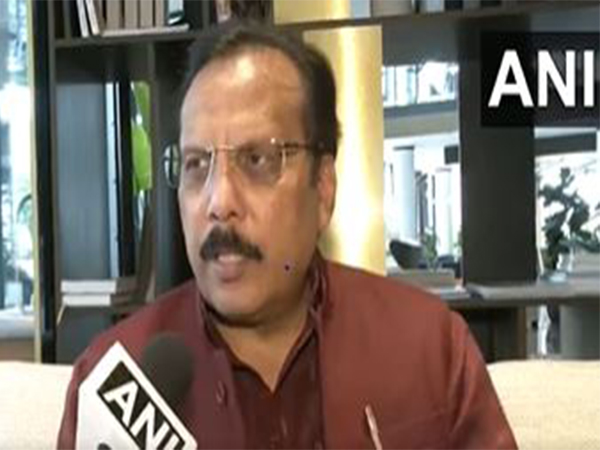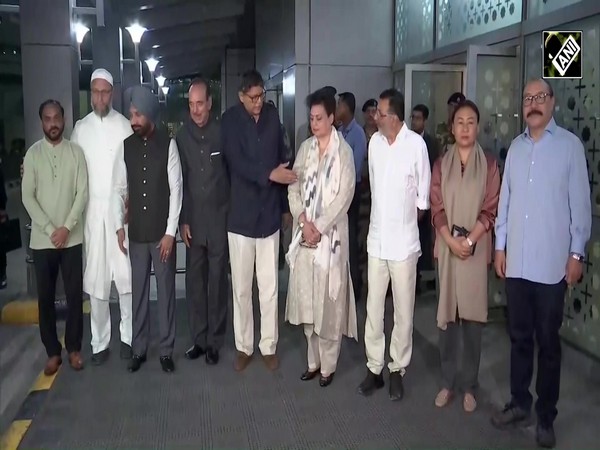
Beijing cements its strategic relationship with Moscow
May 26, 2025
Hong Kong, May 26 : The leaders of China and Russia met in person yet again on 8 May, as Chairman Xi Jinping visited Russia for the eleventh time to attend a parade marking the 80th anniversary of victory in World War II. The tone of the two strongmen has become
more confrontational as they present a united front to take on the USA and attempt to
reshape the global geopolitical landscape.
Some 29 world leaders - many with a dictatorial or authoritarian bent - appeared at Russia's victory parade, where visiting Chinese troops participated alongside their Russian counterparts. However, no foreign leader was more important than the guest of honor from China.
President Vladimir Putin's wanton invasion of Ukraine has made Russia even more dependent on Chinese support, and Xi has been pleased to offer words and actions that underpin Putin. This includes buying up Russian oil and gas, as well as delivering dual-use items such as computer chips and equipment that aid Russia's war machine.
Meeting in the Kremlin the day prior to the parade, Xi and Putin had much to discuss as the world reels from President Donald Trump's unpredictable behavior and his imposition of tariffs, and as Putin continues to prosecute his war of attrition against Ukraine.
One key theme was the pair's vow to "increase interaction and strengthen cooperation" as they criticized American efforts to contain them. Indeed, the two countries' summit forged a step forward in their strategic convergence.
Laughably, Putin said the pair was "interested in creating a just and democratic multipolar world order". Xi echoed such sentiments, vowing they would together "defend international justice and equality" and that "it is imperative that we remain the defenders of a world order in the spirit of equality and justice".
Yet both countries have shameful human rights records, and no viable democratic institutions exist in either place. The Human Freedom Index 2024, published by the Cato Institute last year, gave China a ranking of 150th place out of 165 for human rights, and Russia earned a little-better ranking of 139. The index showed that the freedom scores for both countries continue to drop, with China down three places and Russia dropping 16 spots globally since the 2021/22 edition of the Human Freedom Index.
The two comrades signed a longwindedly titled joint statement on deepening the comprehensive partnership and strategic cooperation in the new era. China and Russia also signed a spate of more than 20 agreements, including one to establish a nuclear power plant on the Moon by 2035 to set the foundation for a permanent lunar research base.
Other deals covered sharing of high-tech products, developing e-commerce and the mutual supply of materials, mineral resources and agricultural products. Last year, China consumed a record US$245 billion worth of Russian exports. Gas from the Power of Siberia pipeline has reached its full capacity of 31 billion cubic meters of natural gas per annum, and another ten billion cubic meters will be added to China's tanks when the Far Eastern gas pipeline begins pumping in 2027.
Already there are some 90 top-priority bilateral programs in sectors such as industrial production, transport, logistics, agriculture and mining that are worth about US$200 million. Also importantly, bilateral trade is now occurring in Rubles and Renminbi to circumvent use of the US dollar. Putin said this arrangement means the two nations are "reliably shielded from the influence of third countries and adverse fluctuations in global markets".
Xi described his nation's current relationship with Russia as "more calm, confident, stable and resilient". Without a trace of irony, they described themselves as defenders of a fair and just world order. They referenced Russia's battle against Nazi Germany in World War II, where Russia lost some 27 million souls, as Putin attempts to use that struggle to energize his troops and morally strengthen his populace.
The two neighbors "shoulder the common responsibility and mission of maintaining a correct view of World War II history," which, translated, means they see themselves as the primary victors of that war, and therefore the legitimate guardians of the postwar international order. China and Russia are obviously reframing and revising history to suit their respective national narratives.
Referring to this emphasis on past victories, Dr. Matthew Johnson, Senior Fellow at The Jamestown Foundation think-tank in the USA, said: "By invoking shared trauma and glory, the coverage positioned the PRC's current geopolitical assertiveness as a continuation of its historical role in defeating fascism, now extended to countering hegemonism in a 'new era' of strategic flux. Most importantly, the coverage reinforced the message that the PRC's strategic line is succeeding without adjustment."
The China Neican, a website that offers commentary on contemporary China, remarked on China's and Russia's focus too: "By presenting themselves as co-architects and custodians of the postwar order, they are instrumentalizing history to reinforce a shared worldview, deepen their partnership and cast the United States as antagonist."
The China Neican said further, "They claim that the core legacy of the war is the UN-centered international system and its founding principles - now under threat and in need of defense. Unnamed actors - clearly referring to the United States and its allies - are accused of distorting history, practicing unilateral coercion and seeking to revise the outcomes of the war."
It is surely somewhat ironic that Beijing and China are blaming the USA for the very thing that the West accuses them of! As the biblical prophet Jeremiah warned, "Woe to those who call evil good and good evil, who put darkness for light and light for darkness, who put bitter for sweet and sweet for bitter."
Under Mao Zedong, the Chinese Communist Party's (CCP) framing was one of revolutionary triumphalism, with the party the main force of national salvation during World War II. In the Deng Xiaoping era, the official narrative shifted toward victimhood and national humiliation, where the party restored national dignity. Now under Xi, he is presenting a picture of the party prevailing after this period of suffering. It is a people's victory, under the wise tutelage of the CCP.
However, China and Russia are going beyond merely invoking or revising established history, for they are mobilizing it to support their efforts to change the international order, and even painting a picture of themselves faithfully defending that order at all costs.
In their statements, Xi and Putin pronounced their resistance to US dominance, NATO expansion and the "subversion" of the postwar order. Putin stated, "Our shared heroic past and combat brotherhood form a solid foundation for the development and strengthening of Russia-China relations. These relations have reached the highest level in history, being self-sufficient and independent from internal political factors or momentary global agendas."
Their partnership is apparently built upon "the unshakable principles of equality, mutual support and assistance, as well as the unbreakable friendship between the two states and two nations". They portrayed their relationship as a natural, defensive response to American hegemony.
Yet it is somewhat ironic that Trump has been extremely soft on Russia so far. Trump regularly repeats Putin's talking points and asserts the same falsehoods, such as the causes of the Ukraine war. To date, despite promises that he would end the war on day one of his presidency, Trump has utterly failed to do so, and nor has he even gained any concessions from Russia.
Johnson remarked about the Sino-Russian partnership, "While framed as defensive, the alignment reflects a deeper ideological and structural commitment to constructing parallel systems in trade, security and information governance."
An associated Joint Statement on Global Strategic Stability accused US nuclear-sharing alliances and space weaponization efforts of eroding deterrence and heightening the risk of nuclear conflict. In their joint statement the two autocrats also slammed Trump's plan for a "Golden Dome" missile defense shield encompassing the whole of the USA, describing it as "deeply stabilizing".
Johnson summarized, "Military cooperation is reaffirmed but, again, carefully bounded." There were thus calls for expanded joint exercises, as well as air and maritime patrols and military-technical exchanges. Overall, this is similar to what the two sides have said on previous occasions.
Training has become increasingly complex and larger in scale, however. For example, China and Russia conducted their ninth joint strategic air patrol in November 2024, the second such episode of the year. The two-day drills involving 27 aircraft were significant because China for the first time used its H-6N bomber, an aircraft type capable of carrying nuclear weapons. The flights traversed the Sea of Japan and East China Sea.
China and Russia have been performing joint air patrols since 2019. Such efforts reflect their shared objective of counterbalancing Western power as both nations face mounting pressure from the West.
Another document signed at the same time was the Joint Statement on Further Strengthening Cooperation in Safeguarding Authority of International Law. It reasserted that the two sides "resolutely uphold the UN-centered system of international relations and the world order based on international law". Old canards such as "non-interference and sovereign equality" were aired, but they were framed in such a way as to shield themselves from scrutiny over their own illegal behaviors. Both countries are ignoring UN mandates in their Ukraine war and illegal claims of territory in the South China Sea respectively. It is obvious that these are mere epithets voiced for consumption by the gullible, for they plan to only use institutions like the UN to achieve their own ends. They just as easily ignore the UN when it intersects with their own selfish and expansionist aims.
Johnson of The Jamestown Foundation noted, "Taken together, these documents outline an ambitious, multipronged attempt to frame bloc alignment as both defensive and legally justified. This alignment is normative, not merely strategic."
Despite the flowery rhetoric, there is still mistrust on both sides. There is asymmetry in the bilateral relationship too, as Moscow has become evermore dependent on China since launching its war against Kyiv. Xi must also temper his friendship with Russia by attempting to appear neutral over Putin's revisionism against Europe. Indeed, Xi did not even mention Ukraine in his statement.
Another topic dear to both leaders' hearts is the Arctic. Putin said "significant progress has been made in the development and commercial operation of the Northern Sea Route. As a result, passenger and freight flows between Russia and China continue to grow steadily, with increased throughput at border crossings, several of which now operate 24 hours." While there will be "mutually beneficial cooperation on the Arctic route," Moscow will surely be reluctant to cede any governance of this strategically important route to China.
The Jamestown Foundation academic further noted, "The closer Beijing and Moscow move toward each other's strategic redlines, however, the more likely constraints are to appear, most notably in Central Asia and, for Russia, the Arctic. The statement codifies direction but does not substantively increase velocity, indicating that while the PRC and Russia remain committed to long-term alignment, they are still constrained by strategic caution, regional rivalry and the need to manage external economic blowback."
Putin will next meet Xi in Beijing in September as they commemorate victory over Japan in World War II. We might expect that the same narrative formed in Moscow will be part of the propaganda there too.


























